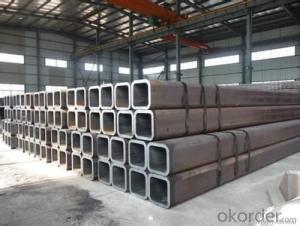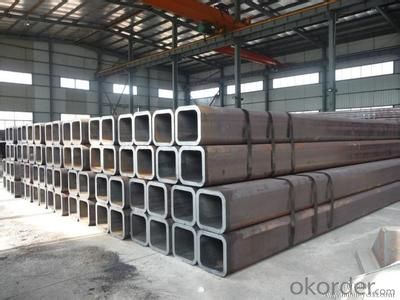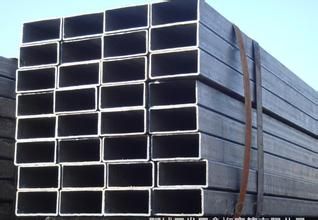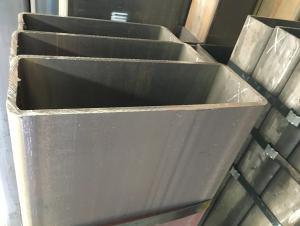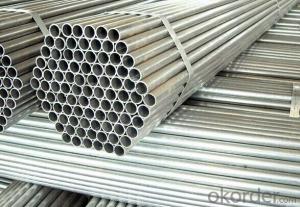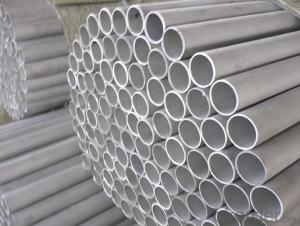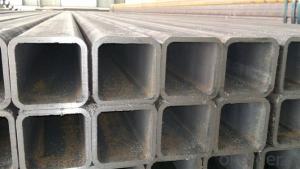Square Hollow Rectangular Cross Section Tube Construction
- Loading Port:
- Tianjin
- Payment Terms:
- TT or LC
- Min Order Qty:
- 15 m.t.
- Supply Capability:
- 5000 m.t./month
OKorder Service Pledge
OKorder Financial Service
You Might Also Like
Product Description:
Product Name | rectangular hollow section/ RHS | |
Size | Size: | 10*10--500*500mm |
Thickness: | 0.45--16mm | |
Length: | 3-12m | |
Steel Grade | Q195,Q215,Q235,Q345,16Mn, 20# | |
Standard | ASTM A500,EN10219,GB/T6728,GB/T6725,JIS G3466 | |
Usage | 1. For Structure, Airport, Railway 2. Construction and so on. | |
Ends | Plain end or By Your Choice | |
Surface | Bared Or With Oiled Or Galvanized | |
Technique | ERW ,Hot Rolled and Cold Rolled | |
Section Shape | Rectangular | |
Inspection | With Hydraulic Testing, Eddy Current , Infrared Test | |
Package | Bags, Bundle, In Bulk, Containers | |
MOQ | 20 Metric Ton / Can Be Negotiated | |
Supply Ability | 15,000 Metric Ton/Month | |
Date of Delivery | 7 days(Qty within 1000 Metric Ton) or According To The Quantity | |
Port of Shipment | Tianjin, China | |
Payment | L/C T/T | |
FAQ of Rectangular Steel Tube
①How is the quality of your products?
Our products are manufactured strictly according to national and internaional standard, and we take a test
on every pipe before delivered out. If you want see our quality certifications and all kinds of testing report, please just ask us for it.
Guaranteed: If products’ quality don’t accord to discription as we give or the promise before you place order, we promise 100% refund.
②How about price?
Yes, we are factory and be able to give you lowest price below market one, and we have a policy that “ for saving time and absolutely honest business attitude, we quote as lowest as possible for any customer, and discount can be given according to quantity”,if you like bargain and factory price is not low enough as you think, just don’t waste your time.Please trust the quotation we would give you, it is professional one.
③Why should you chose us?
Chose happens because of quality, then price, We can give you both.Additionally, we can also offer professional products inquiry, products knowledge train(for agents), smooth goods delivery, exellent customer solution proposals.Our service formula: good quality+good price+good service=customer’s trust
SGS test is available, customer inspection before shipping is welcome, third party inspection is no problem.
If you have any question, pls feel free to contact us !
Rectangular Hot Rolled Steel Tube Image
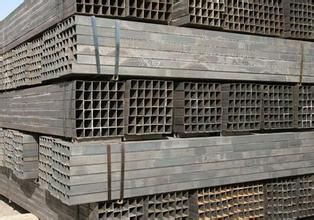
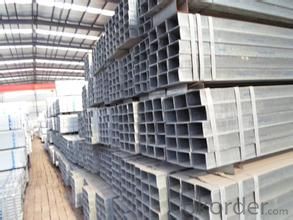
- Q: How much is 4 inches steel tube MM?
- The nominal diameter of the 4 inch steel pipe is DN100, that is to say, the diameter of the center of the pipe wall is 100mm.
- Q: Can steel pipes be used for conveying chemicals?
- Yes, steel pipes can be used for conveying chemicals. Steel is a strong and durable material that can withstand high pressure and temperature conditions, making it suitable for transporting various chemicals. Additionally, steel pipes have excellent resistance to corrosion, which is crucial when dealing with corrosive substances. They are commonly used in industries such as oil and gas, chemical processing, and water treatment where the safe and efficient transport of chemicals is essential. However, it is important to consider the specific requirements of the chemical being conveyed and ensure that the steel pipe is compatible with it. Proper material selection, including the use of corrosion-resistant coatings or linings, may be necessary to prevent any adverse reactions between the chemicals and the steel pipe.
- Q: How do you transport steel pipes safely?
- Steel pipes can be transported safely by properly securing them using appropriate restraints, such as straps or chains, to prevent shifting or movement during transit. Additionally, using suitable equipment and vehicles, such as flatbed trucks or trailers, with adequate support and cushioning, can help ensure the safe transportation of steel pipes. Regular inspections of the securing arrangements and adherence to relevant safety regulations are also crucial to maintain the safe transport of steel pipes.
- Q: How are steel pipes used in the defense sector?
- Steel pipes are used in the defense sector for various purposes such as constructing military infrastructure, manufacturing weapons, and creating protective barriers. They are often utilized in the construction of military bases, ammunition storage facilities, and communication systems. Steel pipes are also crucial for manufacturing armored vehicles, artillery, and missile systems. Additionally, they are employed in creating barriers and fortifications to enhance security and defense capabilities.
- Q: Can steel pipes be bent?
- Yes, steel pipes can be bent using specialized tools and techniques such as pipe bending machines or hydraulic benders.
- Q: What are the different types of joints used to connect steel pipes?
- Some of the different types of joints used to connect steel pipes include butt joints, socket weld joints, threaded joints, flanged joints, and grooved joints.
- Q: How do you transport and store steel pipes?
- Careful planning and adherence to safety guidelines are essential when it comes to the transportation and storage of steel pipes. The following steps outline the necessary procedures: 1. Select the appropriate mode of transportation: Depending on the quantity and weight of the steel pipes, you have the option to transport them by truck, train, or ship. Evaluate the distance, logistics, and cost-effectiveness of each alternative before making a decision. 2. Package and secure the steel pipes: Proper packaging is crucial to prevent damage during transit. Bundle the pipes together using steel strapping or banding, ensuring a tight and secure fastening to prevent any shifting or movement during transportation. 3. Utilize suitable lifting equipment: When loading and unloading the pipes, make use of appropriate lifting equipment such as cranes, forklifts, or hoists. Ensure that the equipment is capable of safely handling the weight and length of the pipes. 4. Protect against moisture and corrosion: Steel pipes are vulnerable to moisture and corrosion, which can weaken their structural integrity. Apply a protective coating or wrap the pipes with waterproof materials before transportation. Additionally, consider using moisture-absorbing desiccants or placing the pipes on pallets to keep them elevated off the ground. 5. Plan for secure storage: If storing the steel pipes for an extended period, select a dry and secure location. Ensure that the storage area is well-ventilated and shielded from direct exposure to sunlight, rain, or extreme temperatures. Utilize racks or pallets to keep the pipes off the ground and prevent contact with moisture. 6. Conduct thorough inspections for damage: Prior to transportation and after storage, perform comprehensive inspections to identify any damage or signs of corrosion. This proactive approach will enable prompt resolution of any issues and ensure the integrity of the steel pipes. It is important to adhere to local regulations and safety guidelines specific to your region when transporting and storing steel pipes. By following these steps, you can guarantee the safe and efficient transportation and storage of steel pipes while minimizing the risk of damage and preserving their quality.
- Q: What are the different types of pipe fittings used with steel pipes?
- There are several types of pipe fittings commonly used with steel pipes, including elbows, tees, reducers, flanges, couplings, and unions.
- Q: Are steel pipes suitable for industrial applications?
- Steel pipes are an excellent choice for industrial applications. They come with several advantages that make them the preferred option in various industries. Firstly, their strength and durability are exceptional, enabling them to withstand high pressure and heavy loads. This makes them perfect for transporting liquids, gases, and solids. Furthermore, steel pipes exhibit high resistance to corrosion, a critical feature in industrial settings where exposure to harsh chemicals, moisture, and extreme temperatures is common. Their corrosion-resistant properties ensure a longer lifespan and reduce the need for frequent maintenance and replacements. Additionally, steel pipes have a smooth interior surface, minimizing friction and allowing for efficient material flow. This is particularly vital in industries like oil and gas, where the smooth flow of fluids is essential for proper operations. Moreover, steel pipes offer a wide range of sizes and thicknesses, allowing for customization and flexibility in design. They can be easily welded and connected, facilitating simple installation and modification as per specific industrial requirements. Overall, steel pipes provide a combination of strength, durability, corrosion resistance, and versatility, making them highly suitable and widely used in various industrial applications such as oil and gas, construction, water treatment, power generation, and chemical processing.
- Q: Can steel pipes be used for underground water wells?
- Indeed, underground water wells can utilize steel pipes. The selection of steel pipes is frequently based on their robustness and resilience, rendering them apt for enduring the exerted force and load of the encompassing soil and water. They are extensively employed in residential and industrial settings for the purpose of drilling and constructing water wells. Nevertheless, it is crucial to take into account specific factors including the steel's type and quality, along with the existence of corrosive components in the water, in order to ensure the durability and dependability of the well system. Moreover, adequate insulation and coating might prove necessary to avert corrosion and contamination of the subterranean water source.
Send your message to us
Square Hollow Rectangular Cross Section Tube Construction
- Loading Port:
- Tianjin
- Payment Terms:
- TT or LC
- Min Order Qty:
- 15 m.t.
- Supply Capability:
- 5000 m.t./month
OKorder Service Pledge
OKorder Financial Service
Similar products
Hot products
Hot Searches
Related keywords
